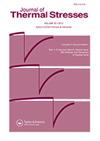An efficient meshfree framework for simulation of crack tip stress fields in two-dimensional graded media subjected to thermoelastic loads
IF 2.3
3区 工程技术
Q2 MECHANICS
引用次数: 0
Abstract
Abstract In the present work a novel framework of algorithm has been proposed for enhancing the versatility of the element-free Galerkin method for modeling of fracture in graded media subjected to thermoelastic loadings. The proposed work restructures the conventional element free Galerkin method (EFGM) at multiple level through generic MATLAB algorithms thereby developing an efficient and robust method for simulating crack tip stress fields in graded material subjected to thermoelastic loads. The proposed algorithm utilizes varying nodal density criterion in conjunction with optimum Gaussian quadrature around these nodes for numerical integration of the governing equations. The proposed algorithm also incorporates blended approximation which is effective for simulating crack tip stress fields in both convex and non-convex problem domains. Nonequilibrium formulation has been selected for evaluating stress intensity factors (SIFs) for the fracture problems in graded media. A few problems of cracked domain subjected to thermoelastic loads have been modeled and simulated to illustrate the effectiveness of proposed framework of algorithms. Further, three component level problems having non-convex domains have also been discussed to establish the robustness and modeling capabilities of the proposed work. A good agreement between the simulated results and reference data demonstrates the algorithm’s competence and robustness for modeling thermoelastic fracture in graded materials. The proposed methodology improves the computational efficiency and flexibility of the element-free Galerkin method for modeling thermoelastic fracture in graded media. Moreover, enhancement of computing speed with the proposed methodology adds to its modeling potential.热弹性载荷作用下二维梯度介质裂纹尖端应力场模拟的有效无网格框架
摘要在本工作中,提出了一种新的算法框架,以增强热弹性载荷作用下梯度介质中裂纹建模的无单元伽辽金方法的通用性。该工作通过通用MATLAB算法在多个层面上重构了传统的无单元伽辽金方法,从而开发了一种有效而稳健的方法来模拟热弹性载荷作用下梯度材料的裂纹尖端应力场。所提出的算法利用变节点密度准则和这些节点周围的最优高斯求积来对控制方程进行数值积分。所提出的算法还结合了混合近似,这对于模拟凸和非凸问题域中的裂纹尖端应力场是有效的。选择了非平衡公式来评估梯度介质中断裂问题的应力强度因子。对热弹性载荷作用下裂纹域的几个问题进行了建模和仿真,以说明所提出的算法框架的有效性。此外,还讨论了具有非凸域的三分量级问题,以建立所提出工作的鲁棒性和建模能力。模拟结果与参考数据之间的良好一致性证明了该算法在梯度材料热弹性断裂建模方面的能力和鲁棒性。该方法提高了无单元伽辽金法在梯度介质中模拟热弹性裂缝的计算效率和灵活性。此外,所提出的方法提高了计算速度,增加了其建模潜力。
本文章由计算机程序翻译,如有差异,请以英文原文为准。
求助全文
约1分钟内获得全文
求助全文
来源期刊

Journal of Thermal Stresses
工程技术-力学
CiteScore
5.20
自引率
7.10%
发文量
58
审稿时长
3 months
期刊介绍:
The first international journal devoted exclusively to the subject, Journal of Thermal Stresses publishes refereed articles on the theoretical and industrial applications of thermal stresses. Intended as a forum for those engaged in analytic as well as experimental research, this monthly journal includes papers on mathematical and practical applications. Emphasis is placed on new developments in thermoelasticity, thermoplasticity, and theory and applications of thermal stresses. Papers on experimental methods and on numerical methods, including finite element methods, are also published.
 求助内容:
求助内容: 应助结果提醒方式:
应助结果提醒方式:


